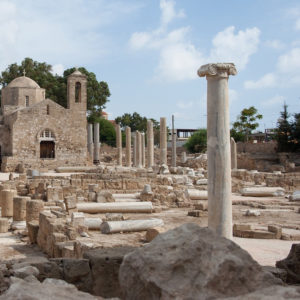 When asked to identify something foundational for the early church, my mind gravitated directly to the outpouring of the Holy Spirit. The gift of the Holy Ghost is the catalyst and most basic requirement for all we do. It brings “Spiritual birth” (John 3:5); the Spirit guides us into all truth (John16:13) and teaches us all things, bringing into remembrance all the things that Jesus said (John 14:26). The Holy Ghost will give us the words when we find ourselves wanting (Luke 12:12). However, the fundamental principle that I have chosen to explore, predates the outpouring of the Spirit and reflects on filling the seat left by Judas Iscariot.
When asked to identify something foundational for the early church, my mind gravitated directly to the outpouring of the Holy Spirit. The gift of the Holy Ghost is the catalyst and most basic requirement for all we do. It brings “Spiritual birth” (John 3:5); the Spirit guides us into all truth (John16:13) and teaches us all things, bringing into remembrance all the things that Jesus said (John 14:26). The Holy Ghost will give us the words when we find ourselves wanting (Luke 12:12). However, the fundamental principle that I have chosen to explore, predates the outpouring of the Spirit and reflects on filling the seat left by Judas Iscariot.
In Acts chapter one, Peter gathered the disciples and quoted David, “Let another take his office” (Psalm 109:8). When considering this decision, the eleven came up with one specific requirement, “Beginning from the baptism of John, unto that same day that he was taken up from us, must one be ordained to be a witness with us of his resurrection” (Acts 1:22). This was a reasonable request. Still, when they looked around this upper room, only two men qualified. With only one position available, the disciples chose their “witness.”
Moving forward to Acts chapter six, the Spirit has empowered the church and its leadership to do incredible things. The church was growing, and the Apostles needed to concentrate their efforts on prayer and ministry of the word (Acts 6:4). So much so that there was a need for some help. There were now two requirements to fill these positions. Spreading further and into new territory, it took more work to find people who had followed the entire earthly ministry of Jesus. The leadership asked for candidates with an honest report, full of the Holy Ghost and wisdom (Acts 6:3). These men may not have had direct contact with the Messiah, but through the Holy Ghost working inside of them, they had obtained a good “witness” from all of those around them. Who wants waitpersons with bad attitudes?! These seven men were chosen to be servants, one of the last lessons Jesus taught His disciples as He washed their feet.
Today’s church has expanded into every ministry imaginable, and more are growing daily. Leadership faces placing servants into roles that best represent the local congregation and the Kingdom of God. I am sure they consider areas such as faithful church attendance, personal history (in some cases), perhaps financial records, altar working, and attitude toward others. There are so many things to contemplate and filter out rumors from truths. My Pastor once told me that he hasn’t been fooled very often, but eventually, a person’s true nature reveals itself (Numbers 32:23).
To help with these types of decisions, leadership may refer back to Acts 6 and choose those “full of the Holy Ghost and wisdom” for “the Spirit itself beareth witness with our spirit, that we are the children of God:” (Romans 8:16). They may also apply a lesson from Matthew 16 when looking for those with an honest report. Jesus asked what people were saying about Him. Then he asked these would-be church founders, who do you say that I am? Jesus declared that Peter’s answer was a revelation straight from God. When the rumors do not collaborate with the narrative, we turn to God for divine insight.
The church was committed to prayer and supplication in an upper room when they decided to look amongst their ranks for a good witness. This principle can and should be applied today. When the world around us is collapsing, and souls look out from the darkness to catch any glimpse of light, the representation of Jesus should be impeccable. Do not forsake a daily walk with the Master. “Teaching every man in all wisdom; that we may present every man perfect in Christ Jesus:” (Colossians 1:28). We are not perfect and may have a dark past, but our future is bright, and we can share Christ in us, the hope of glory (v.27) with others to be a good “witness” of all that Jesus has done.